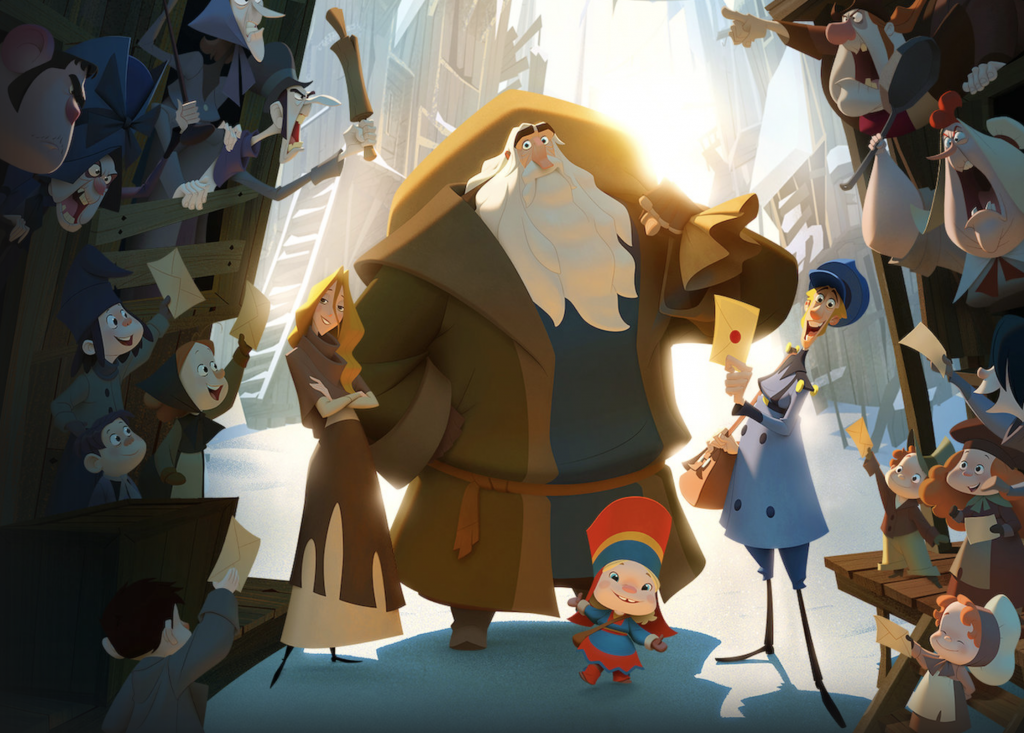December is upon us, which means it’s time to start making your Christmas movie watchlist (unless you’re a true fanatic, in which case you’re already halfway through).
Whether you’re a traditionalist who loves watching the classics annually or an adventurer seeking something new each year, Netflix’s recently released “Klaus” deserves a spot on your list: the streaming giant’s debut feature-length animated film delivers a refreshingly profound message on Christmas wrapped in beautiful animation that the whole family can enjoy.
The film opens on Jesper (Jason Schwartzman), the spoiled son of a wealthy businessman who owns a postal service company. Fed up with his son’s laziness and overreliance on the family fortune, Jesper’s father assigns him to a postal position on the remote northern island of Smeerensburg, where he must deliver 6,000 letters in a year, or else face being cut off.
As if the long, grueling journey weren’t punishment enough, Jesper finds that Smeerensburg is a bitter town besieged by family feuds, and no one cares to send mail of any kind.
No one, that is, until Jesper encounters a certain old man with a white beard who enjoys secretly delivering toys to children.
Such a setup might strike one as a cross between Disney’s “The Emperor’s New Groove” and the 1970 Christmas special “Santa Claus is Comin’ to Town.” But what makes “Klaus” stand out is that through a narrative of secular holiday folklore, it actually undoes the materialist mindset of shopping-mall Santas and makes an earnest attempt to capture the true spirit of Christmas.
The key to this paradox begins with Jesper. As he and Klaus (that aptly named old man with the white beard, powerfully voiced by J.K. Simmons) haul presents back and forth to the Smeerensburg children, the postman pinpoints what any skeptic of the Santa Claus tradition might observe: Aren’t these kids just in it for themselves? How could their good behavior really be genuine when they know it will be rewarded with a gift?
But when Jesper observes the effects of their deliveries, he gradually discovers the joy that can’t help but spring from quiet generosity that does not seek recognition.
Through a neatly packaged plot that unfolds in a simple, organic way, “Klaus” reveals how a good deed once done for personal gain can, through the pure wonder and gratitude that flows from the hearts of children, rapidly become a deed done as a personal gift.
As if these hopeful elements weren’t enough, the film expresses Christian undertones that reinforce the message and make it even more satisfying. For one thing, it is clear that while “Klaus” is an origin story of Santa Claus, it is not an origin story of Christmas, and never claims to be.
On the contrary, the characters acknowledge Christmas as an established, special holiday quite separate from Klaus and Jesper’s unseen toy deliveries. In fact, the benevolence that their gift-giving spreads ends up helping the villagers prepare for Christmas better, with more warmth and cheerfulness than ever before.
And while Jesus isn’t mentioned by name, the hymn “Silent Night” floats through the air as the holiday preparations light up the Smeerensburg streets.
“Klaus” is a true family movie not only because it celebrates childlike wonder and gratitude within the context of Christmas, but also because it reveres the beauty of self-giving love within the context of marriage and family.
Rarely do films seem to highlight the joyful anticipation (rather than burden) of many children, or the pain (rather than liberation) of infertility, but this film does so in an amazingly natural, moving way. Once again, the film proves itself as much more than a tale about why children write to Santa Claus.
No good family movie is complete without an appropriate dose of fun, and “Klaus” does not fail to provide it.
Thanks to a lively script (written by Zach Lewis, Jim Mahoney, and director Sergio Pablos) delivered by solid voice acting (especially Schwartzman and Joan Cusak, who hilariously portrays one of Smeerensburg’s feuding elders), the film has enough lighthearted moments that will spark laughs just as much as the touching moments will invoke tears.
What’s more, the beautifully crafted 2D animation blends old-school charm with modern sleekness, making the slapstick as well as the sentimental moments refreshing for audiences both young and old.
One almost wishes “Klaus” were longer so that we could learn a bit more about the old toymaker’s past, hear a few more curmudgeonly lines from Cusak’s Mrs. Krum, and see a smidge more of the deepening bond between Jesper and his unlikely new friends.
Still, the film offers a lot in just 96 minutes: silliness and fun, wonder and hope, and overall a lesson in true charity without even proclaiming itself moral teacher. In fact, it is very much like the spirit of St. Nicholas himself: subtle and unassuming, yet bearing a sack full of delights. And that makes it 96 minutes well-spent.

